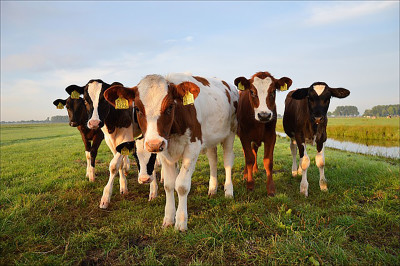
In order to address issues regarding animal health and European Union consumer concerns, the European Parliament announced Sept. 8 its decision to ban the cloning of all farm animals, including cattle, sheep, pigs, goats and horses.
According to the European Food Safety Authority, cloning as a practice does not affect the safety or quality of food. Citizens are more so concerned by the welfare of surrogate mothers, as well as the health of reproduced animal clones themselves. As a result, the sale of cloned animals and calves has also been banned.
Elizabeth Rozanski, a professor at Tufts University’s Cummings School of Veterinary Medicine, said she believes that the topic of cloning should be carefully considered and executed for the right reasons.
“Clones are not exact duplicates,” she said. “When people want to clone their dog, they will not get back the same dog, just a genetic copy. I think it isn’t a good plan … [However], there are some research advantages to it and cloning helps advance some aspects of science.”
Andrew Hoffman, the director of the Regenerative Medicine Laboratory at the Cummings School, extended Rozanski’s latter claim by pointing out that animals can be developed to enhance genetic traits such as increasing milk productivity, reproduction efficiency and longevity. In fact, he said, discoveries from animal research have not been fully explored.
“[The research] is a very rich source of information that hasn’t been exploited scientifically for the purposes of advancing human medicine,” he said. “It has been a very underdeveloped area. The veterinary workforce, veterinary science, veterinary literatures have been very much [separated] away from the human literature. That’s something I’m passionate about trying to help alleviate.”
Hoffman said that the make-up and anatomy of animals, even in relation to diseases, can be very similar to a human’s. Therefore, he said he believes that the European Parliament’s decision to place a ban on animal cloning is not well-grounded in actual animal ethics.
“The public doesn’t really understand what the advantages and disadvantages are,” he said. “I’m not sure the public has seen the advantages. If the public has not really seen the advantages and scientists haven’t convinced the public that there are advantages, then the devoted public and the parliament [that] represents them are clearly not going to see the balance.”
Hoffman went on to explain that it is likely for the public to see cloning as more of an emotional issue rather than a scientific one.
“I don’t think it’s a decision based on intelligence as much as based on facts that we haven’t seen the big advantages of cloning technology translated into enormous benefits for agriculture or purposes for the public,” he said.
Shedding light on issues regarding animal safety, Rozanski shared that it is precisely that emotion that is holding the EU back from using cloned animals in research.
“I think animal research can be appropriate with careful thought and planning,” she said. “The EU missive is somewhat misguided. It is looking to prevent the cloning of farm animals for us as food. This is an impractical step.”
Sharlayne Arana, a junior in Boston University’s College of Arts and Sciences, served as a coordinator for the animal issue area during this summer’s First-Year Student Outreach Project. She also does not see animal cloning as a black-and-white issue.
“Animal cloning is simultaneously ethical and unethical,” she said. “In the long run, animal cloning can be ethical if we use it to advance science in a way that benefits all animals. However, I deem it unethical to clone and utilize non-human animals to only benefit our species … If animal cloning is ethical, it is only ethical to the extent that its purpose is to serve all animals.”


























































































































